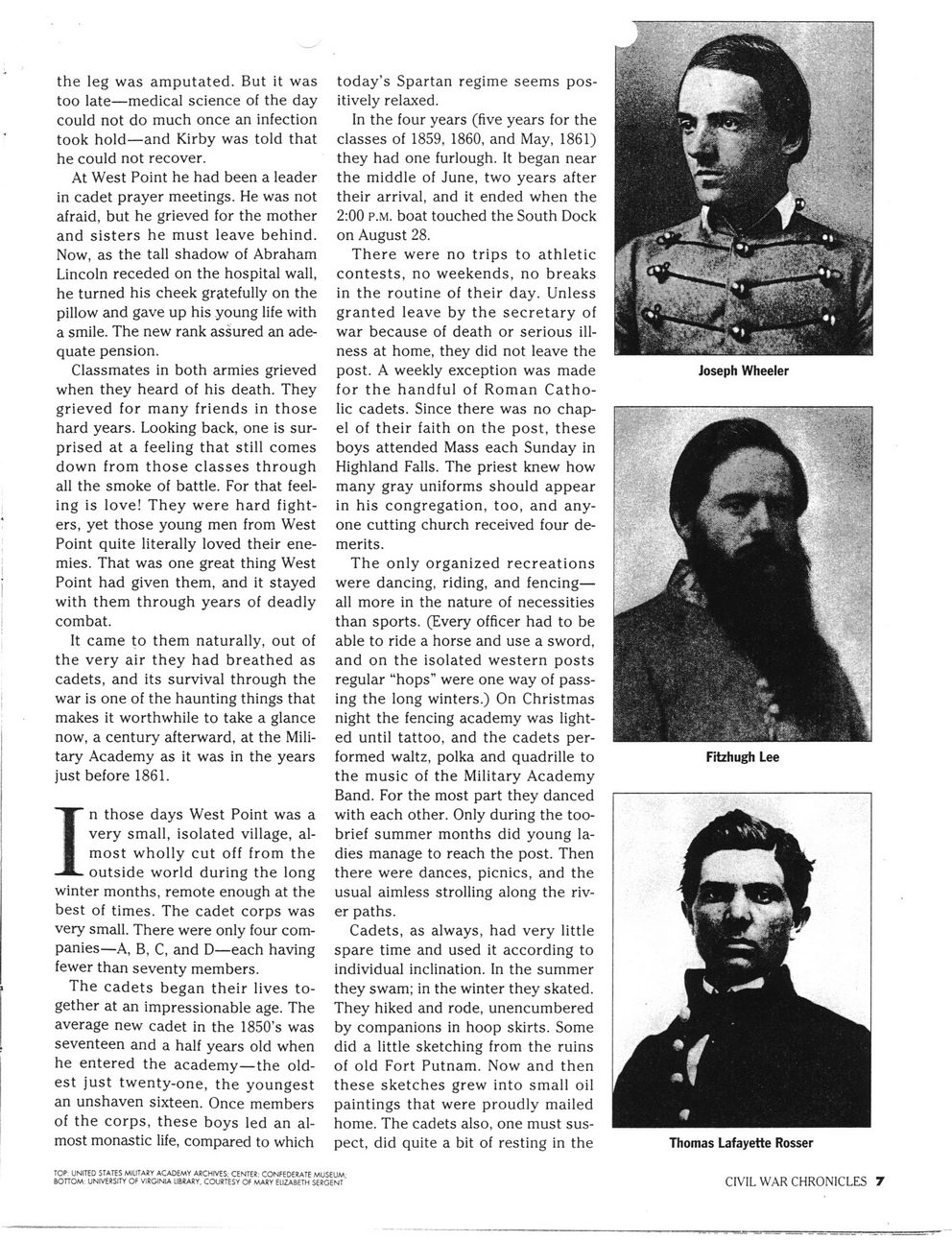This text was obtained via automated optical character recognition.
It has not been edited and may therefore contain several errors.
the leg was amputated. But it was too late?medical science of the day could not do much once an infection took hold?and Kirby was told that he could not recover. At West Point he had been a leader in cadet prayer meetings. He was not afraid, but he grieved for the mother and sisters he must leave behind. Now, as the tall shadow of Abraham Lincoln receded on the hospital wall, he turned his cheek gratefully on the pillow and gave up his young life with a smile. The new rank assured an adequate pension. Classmates in both armies grieved when they heard of his death. They grieved for many friends in those hard years. Looking back, one is surprised at a feeling that still comes down from those classes through all the smoke of battle. For that feeling is love! They were hard fighters, yet those young men from West Point quite literally loved their enemies. That was one great thing West Point had given them, and it stayed with them through years of deadly combat. It came to them naturally, out of the very air they had breathed as cadets, and its survival through the war is one of the haunting things that makes it worthwhile to take a glance now, a century afterward, at the Military Academy as it was in the years just before 1861. In those days West Point was a very small, isolated village, almost wholly cut off from the outside world during the long winter months, remote enough at the best of times. The cadet corps was very small. There were only four companies?A, B, C, and D?each having fewer than seventy members. The cadets began their lives together at an impressionable age. The average new cadet in the 1850?s was seventeen and a half years old when he entered the academy?the oldest just twenty-one, the youngest an unshaven sixteen. Once members of the corps, these boys led an almost monastic life, compared to which today?s Spartan regime seems positively relaxed. In the four years (five years for the classes of 1859, 1860, and May, 1861) they had one furlough. It began near the middle of June, two years after their arrival, and it ended when the 2:00 p.m. boat touched the South Dock on August 28. There were no trips to athletic contests, no weekends, no breaks in the routine of their day. Unless granted leave by the secretary of war because of death or serious illness at home, they did not leave the post. A weekly exception was made for the handful of Roman Catholic cadets. Since there was no chapel of their faith on the post, these boys attended Mass each Sunday in Highland Falls. The priest knew how many gray uniforms should appear in his congregation, too, and anyone cutting church received four demerits. The only organized recreations were dancing, riding, and fencing? all more in the nature of necessities than sports. (Every officer had to be able to ride a horse and use a sword, and on the isolated western posts regular ?hops? were one way of passing the long winters.) On Christmas night the fencing academy was lighted until tattoo, and the cadets performed waltz, polka and quadrille to the music of the Military Academy Band. For the most part they danced with each other. Only during the too-brief summer months did young ladies manage to reach the post. Then there were dances, picnics, and the usual aimless strolling along the river paths. Cadets, as always, had very little spare time and used it according to individual inclination. In the summer they swam; in the winter they skated. They hiked and rode, unencumbered by companions in hoop skirts. Some did a little sketching from the ruins of old Fort Putnam. Now and then these sketches grew into small oil paintings that were proudly mailed home. The cadets also, one must suspect, did quite a bit of resting in the Joseph Wheeler Fitzhugh Lee Thomas Lafayette Rosser TOP: UNITED STATES MILITARY ACADEMY ARCHIVES, CENTER: CONFEDERATE MUSEUM BOTTOM: UNIVERSITY Of VIRGINIA LIBRARY, COURTESY OF MARY ELIZABETH SERGENT CIVIL WAR CHRONICLES 7

Ames, Adelbert Civil-War-Chronicles-page07